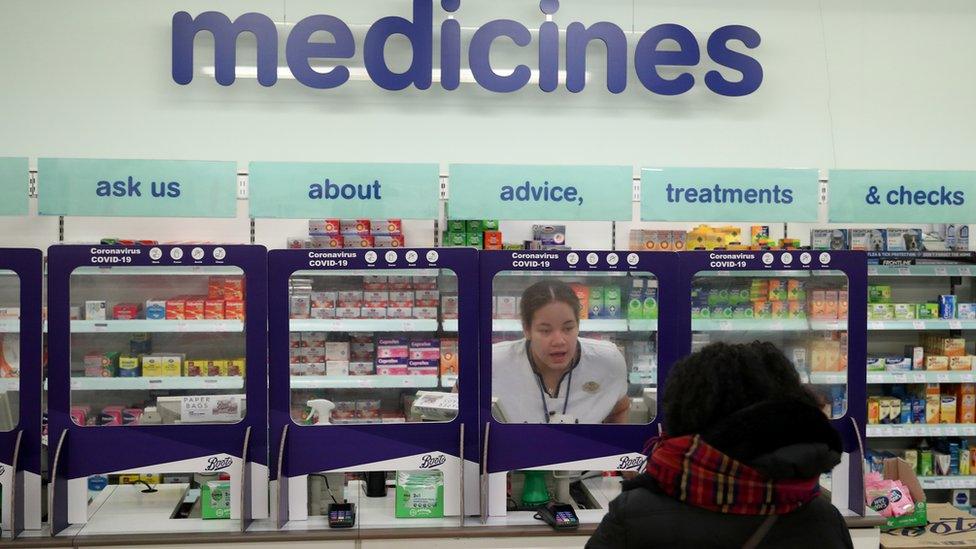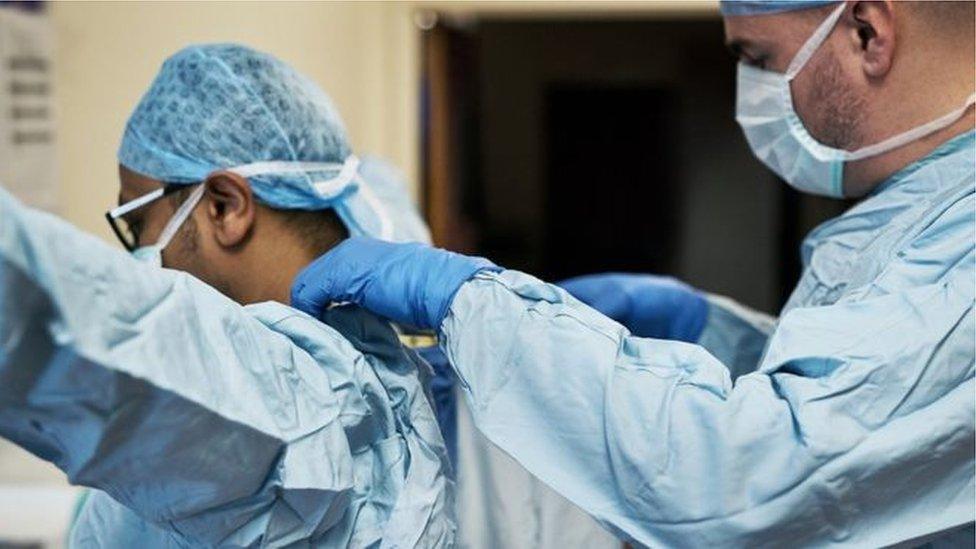Coronavirus: High street pharmacists 'needlessly put at risk'
- Published
- comments

Safety screens protect a pharmacist at Boots, but others say they are being put at risk
High street pharmacists are "needlessly being put at risk" of catching and spreading coronavirus due to a lack of personal protective equipment (PPE), a professional body says.
The Royal Pharmaceutical Society says that its members have not got the right equipment - masks, gloves and aprons.
Health Secretary Matt Hancock has said that pharmacists are key health care professionals and are entitled to PPE.
NHS England said millions of pieces of PPE were being delivered.
The chief pharmaceutical officer Keith Ridge has said the government is making arrangements to get the equipment to pharmacists.
'Abandoned on the front line'
Community pharmacists work as contractors for the NHS or for pharmacy chains like Lloyds or Boots and are the first port of call for much of the public when unwell.
Pharmacists give health advice, dispense medication and check doctor's prescriptions for errors.
Pharmacist Johnathan Laird, 36, who is editor of Pharmacy in Practice, said: "Pharmacies can be very small and we have to get close to patients - it's impossible to keep a two metre distance.
"The least we expect when delivering NHS services out there is safe and effective PPE. Some pharmacies have bought plastic screens and masks out of their own pocket. That's something the NHS should be paying for."

A SIMPLE GUIDE: How do I protect myself?
AVOIDING CONTACT: The rules on self-isolation and exercise
LOOK-UP TOOL: Check cases in your area
MAPS AND CHARTS: Visual guide to the outbreak
VIDEO: The 20-second hand wash

Graham Phillips, 60, is a pharmacist who runs several pharmacies in Hertfordshire and Essex. He said "my blood is boiling at the callous indifference NHS England has shown towards me and my colleagues.
"Community pharmacists have been abandoned on the front line.
"I have tried to source PPE at my own cost - but it has proved impossible to find adequate supplies and I am certain some of my colleagues will die as a result."
Without a ready supply of protective equipment, pharmacists fear they are likely to become unwell - and without the local pharmacy network many patients could struggle to get their prescriptions.
Robbie Turner, director of pharmacy at the Royal Pharmaceutical Society, said: "The problem the message pharmacists have been getting up until now is to buy PPE from wholesalers. When they even have them in stock it's expensive.
"Pharmacies should not be having to go out and buy protection to keep them safe - this should be supplied by the NHS. Without it pharmacists are being needlessly put at risk."
NHS guidance says that pharmacists in high street stores should wear masks in store and wear gloves and aprons whilst in close contact with patients.
Some pharmacists say they have been forced to ration what PPE they have - and use gloves and masks only when a patient comes in with suspected coronavirus.
'We are unprotected'
Naba Hussain, 29, a pharmacist in London, said: "We are the front line - GP surgeries are shut so if anyone is ill they go to the pharmacy.
"We are unprotected and the most at risk. People could be asymptomatic or with the coronavirus symptoms."
Naba said customers often don't take the government's coronavirus guidelines seriously.
"One guy came in for advice the other day saying my partner has coronavirus, what should I do? I told him he needed to leave the pharmacy, self-isolate at home and call 111."
"I sometimes ask myself if it's worth going into work and ask myself why I put myself at such high risk when customers aren't taking coronavirus seriously."
Mark Lyonette, chief executive of the National Pharmacy Association, said that pharmacy staff needed protective equipment "without delay", along with access to testing and funding to cover "vastly increased costs".
A spokesperson for the NHS said the latest advice, endorsed by the royal colleges, is that pharmacists should rarely require protective equipment but "it is vital that all those who need it get the right level of protection".
Millions of pieces of protective equipment have been procured and are being delivered to front line workers, the spokesperson said.
"Where there are any issues with supply, staff can raise them through a dedicated hotline, which is open 24/7."
- Published3 April 2020
- Published2 April 2020
